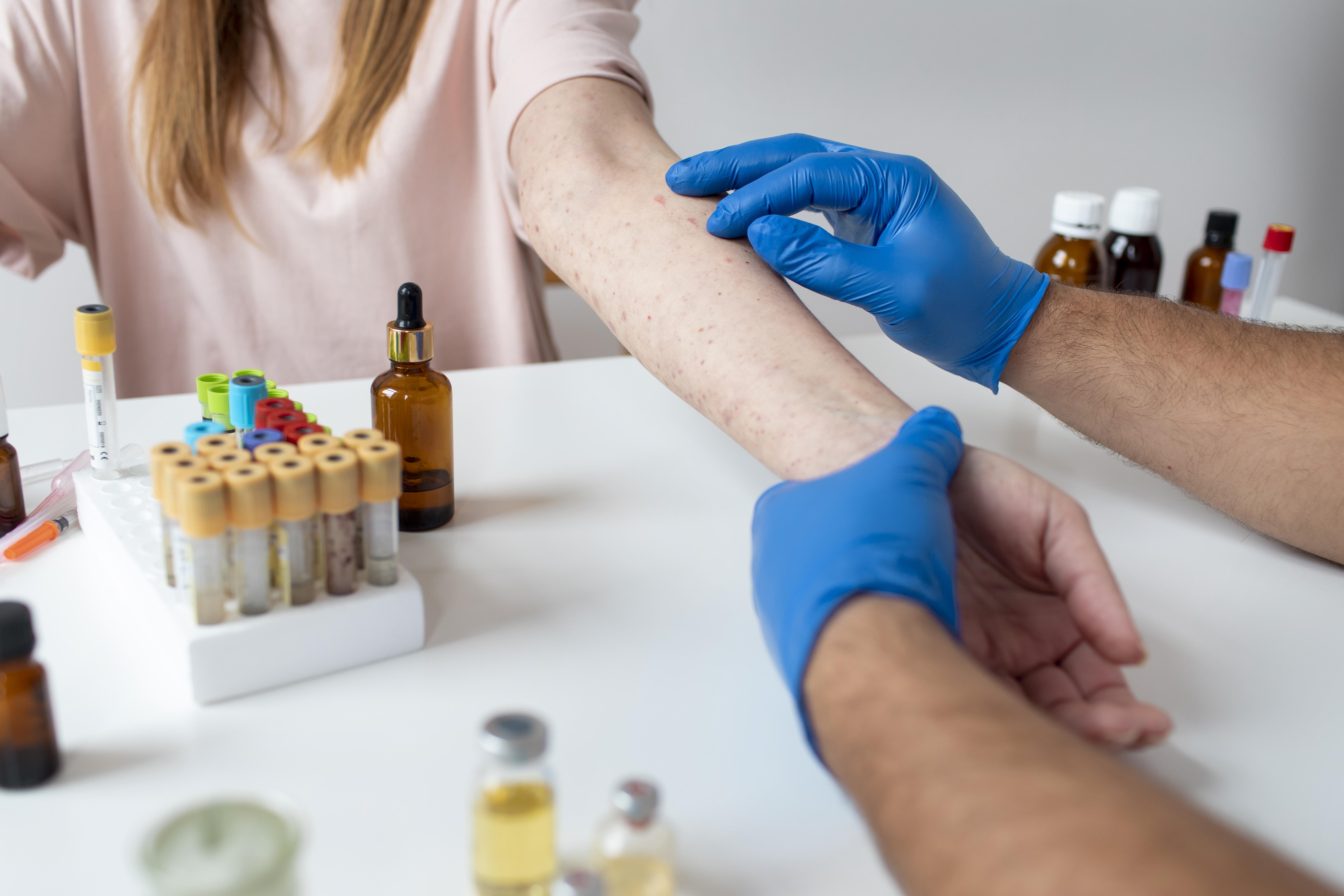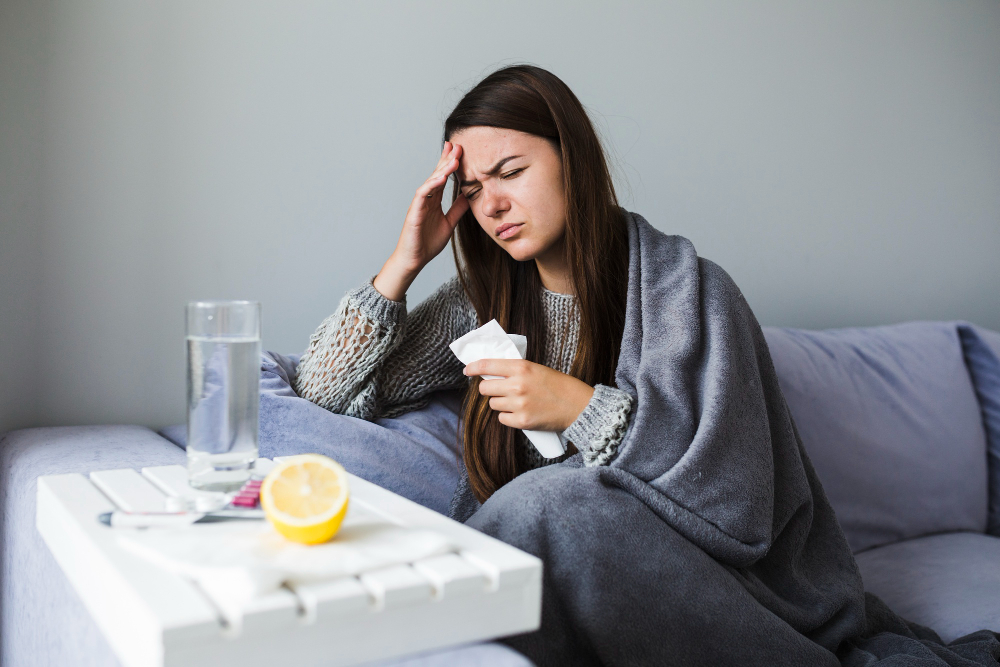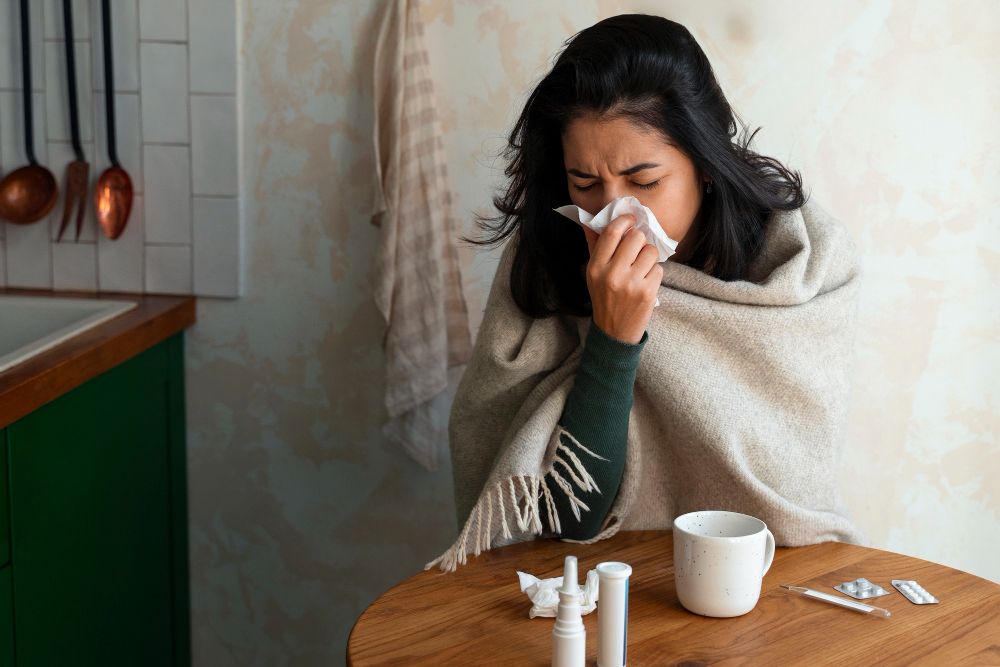Book on Whatsapp
9892101616
Safety Measures to Stay Hygienic & Hydrated during Monsoon
Monsoon Fever
Fri Jul 28 2023
Monsoons enter like a breath of fresh air to cool down the humidity in climate. There’s always an unmatched level of excitement amongst the masses when it comes to the rainy season. Whether it is food, music or planning to hang out with loved ones. But wait! Before you step out in the downpour, we want to ensure your wellness to make sure monsoon season precautions are implemented by everyone.
If monsoon is synonymous with excitement and poetry, then it is also a middle name for monsoon season diseases such as typhoid , malaria, dengue etc. At Manipal TRUtest we have various fever packages occurring from monsoon season disease. We have charted out some precautionary measures that need to be followed to stay hygienic and hydrated even during the heavy rain.
Rainy Season’s health and safety tips:
Ensure sanitation and safety:
- Use Mosquito Repellent: Apply trusted mosquito repellents to combat the attacks of mosquitoes on exposed areas of skin. Apply it evenly, resisting any cut-outs over skin. Opt for products comprising picaridin, DEET or other recommended ingredients.
- Avoiding pooling of water: Do not let any water get pooled inside or around your home to prevent developing or multiplying of dangerous mosquitoes. This is where they originate and start spreading water-borne ailments. Keep changing the stored water in water coolers.
- Use mosquito Nets: Try sleeping under mosquito nets, especially in areas prone to water-borne ailments such as dengue, fever, and malaria. You can also install screens over windows and doors to stop the mosquitoes from entering your space and breeding there.
Keep your living spaces spick-and-span:
It is crucial for disinfecting surfaces at home to prevent filth and bacteria or viruses from spreading themselves. Keep the dirt and germs at bay by frequently moping and sweeping the floors. Meanwhile, keep the damp areas such as the bathroom clean and dry. Regularly wipe the kitchen surfaces and regularly frequented spots in your living space using trusted disinfectant products. Try using an air freshener for a refreshing environment.
Complete hydration of body:
Keep yourself hydrated throughout the season by following steps:
1) Drink up: Remember to drink plenty of water throughout the day. Aim for at least 8 glasses (or more) to stay properly hydrated. Don't wait until you're thirsty!
2) Fruit-Infused Refreshment: Add a burst of flavour to your water by infusing it with slices of fresh fruits like lemon, cucumber, or strawberry. It's not only delicious but also a fun way to stay hydrated.
3) Hydrating Snacks: Munch on hydrating snacks like juicy watermelon, refreshing cucumbers, or hydrating fruits like oranges and berries. They'll help replenish your body's water levels.
4) Drink Coconut Water: For a natural electrolyte boost, sip on coconut water. It's a tasty and hydrating alternative to sugary drinks, plus it provides essential minerals.
5) Set Hydration Reminders: It's easy to forget to drink water when you're busy hanging out in the monsoon or working in office. Set reminders on your phone or use hydration apps to stay on track.
6) Hydration on the move: Whether you're hitting the beach or going for a hike, make sure to bring a reusable water bottle. It's eco-friendly and keeps you hydrated while enjoying outdoor adventures.
Remember, staying hydrated keeps you energized, supports your overall health, and helps you enjoy the monsoon to the fullest. Stay cool and drink up!
Monsoon Diseases Diagnosis
If you face any health concerns, feel free to book a test at Manipal TRUtest and choose from the wide variety of our Fever Screening packages to detect the cause of fever i.e. dengue, malaria, Typhoid etc.. Wishing you a day full of sound health. Apart from the above, the following Tests are provided at Manipal Trutest for fever detection -
- Complete Blood Count (CBC): A CBC test can help identify certain changes in the blood cells that are indicative of dengue infection, such as a decrease in platelet count.
- Dengue IgM/IgG Antibody Test: This test checks for the presence of dengue-specific antibodies (IgM and IgG) in the blood. IgM antibodies are typically detected in the early stages of infection, while IgG antibodies develop later.
- NS1 Antigen Test: This test detects the non-structural protein NS1 of dengue virus. NS1 is detectable during the acute phase of dengue virus infections.
- Malaria Vivax & Falciparum Antigen - The test helps to diagnose malaria antigens in the blood.
- Urine Test-Urine tests are non-invasive, accessible, and give valuable insights about your health. They help in diagnosing numerous conditions, monitoring treatments, and improving overall well-being.
- SGPT Test - SGPT test is a blood test performed to measure the enzyme created in the liver called Alanine Transaminase (ALT).
- ESR -the ESR test is an important diagnostic tool in medical practice, helping in the identification, monitoring, and management of inflammatory conditions.
- Typhi Dot TEST - Typhi Dot test (IgM, IgG antibody) is a valuable diagnostic tool to detct typhoid fever
- Bilirubin Total Direct & Indirect - Bilirubin tests are usually ordered to monitor liver health. Indirect bilirubin is the unconjugated form of bilirubin in the blood. Indirect and direct bilirubin together make up total bilirubin
Related Blogs

Monsoon Fever
Post-Monsoon Infections: Why Dengue, Malaria, and Typhoid Blood Tests Are Still Essential in November
The monsoon season brings much-needed relief from the summer heat, but it also creates the perfect environment for several infectious diseases. Even after the rains end, the risk of infections like dengue, malaria, and typhoid remains high. November is a critical month when stagnant water, humid weather, and fluctuating temperatures continue to support the growth of mosquitoes and bacteria. This makes timely blood tests essential for detecting infections early and preventing complications.
Why the Risk Persists After Monsoon
Many people assume that the end of the rainy season marks the end of mosquito-borne and waterborne diseases. However, that is not the case. Stagnant water in open containers, drains, and puddles remains a breeding ground for mosquitoes long after the rains stop. Mosquitoes carrying the dengue and malaria parasites thrive in this environment. Similarly, contaminated water and poor hygiene during the post-monsoon period increase the risk of typhoid and other gastrointestinal infections.
Dengue: Early Detection Matters
Dengue fever is caused by the bite of the Aedes aegypti mosquito. Symptoms often include high fever, body pain, rashes, and nausea. In severe cases, it can progress to dengue hemorrhagic fever, which may lead to internal bleeding and organ damage. A simple blood test, such as the dengue NS1 antigen test or antibody test, helps in quick diagnosis. Early detection is critical because dengue does not have a specific cure, and supportive care works best when started at the right time.
Malaria: A Preventable Yet Persistent Threat
Malaria remains one of the most common post-monsoon infections. It is transmitted by the bite of the female Anopheles mosquito. Symptoms include chills, sweating, fatigue, and recurring fever. If untreated, malaria can cause severe anemia, kidney damage, and other complications. A malaria blood test, such as a peripheral smear or rapid antigen test, confirms the presence of the parasite. Testing is important even if symptoms seem mild, as malaria can quickly worsen without proper treatment.
Typhoid: The Hidden Post-Monsoon Danger
Unlike mosquito-borne diseases, typhoid is spread through contaminated water and food. During November, water stagnation and unhygienic conditions make it easier for the Salmonella typhi bacteria to infect people. Typhoid presents with symptoms like prolonged fever, stomach pain, weakness, and loss of appetite. A Widal test or blood culture can confirm the infection. Timely diagnosis helps in prescribing the right antibiotics and preventing serious complications such as intestinal perforation.
Importance of Blood Tests in November
Post-monsoon illnesses often mimic each other, making self-diagnosis difficult. Fever, fatigue, and body aches can be common to dengue, malaria, or typhoid. Without blood tests, accurate treatment is delayed, which increases the risk of complications. Doctors rely on these tests to confirm the exact cause of illness and to begin the right course of treatment quickly.
Prevention Is the First Step to Protection
Along with regular testing, following preventive measures can greatly reduce your risk:
- Avoid stagnant water around your home.
- Use mosquito repellents and nets.
- Drink clean, boiled, or filtered water.
- Eat home-cooked meals and maintain good hygiene.
- Strengthen your immunity through a balanced diet, fruits, and adequate rest.
By staying alert and proactive, you can prevent infection before it disrupts your health or festive plans.
Stay Protected with Manipal TRUtest
The end of monsoon doesn’t mean the end of infections. November remains a sensitive time for dengue, malaria, and typhoid. A simple post-monsoon blood test can make all the difference in protecting your health.
At Manipal TRUtest, we offer comprehensive fever and infection panels that help detect seasonal illnesses accurately and at the earliest stage.
✅ Book your test today and step into the festive season with confidence and care.
Because your health deserves attention — not assumptions.

Monsoon Fever
When Fever Persists, Get Tested for Better Health
A fever is the body’s natural response to infections, signaling that the immune system is actively fighting off viruses or bacteria. However, when a fever lasts more than 3 days or keeps recurring, it’s essential to take it seriously. In such cases, a fever test can help identify the underlying cause—whether it’s a viral infection, bacterial illness, or something more serious. Ignoring prolonged or repeated fevers may delay the diagnosis of deeper health conditions. A timely fever test ensures early detection and proper treatment, safeguarding your long-term health.
In some cases, a prolonged fever may also indicate a serious bacterial infection, such as typhoid, tuberculosis, or a urinary tract infection. It could also be associated with conditions like malaria, autoimmune disorders, or even certain types of cancers. If left untreated, these underlying issues may worsen over time.
Warning Signs That Require Attention
If a fever lasts more than a few days and is accompanied by chills, night sweats, loss of appetite, fatigue, or unexplained weight loss should not be overlooked.
These symptoms require immediate medical attention. Diagnostic tools like
blood tests, imaging scans, or cultures can help identify the exact cause.
The causes of prolonged fever range from common viral infections like dengue, malaria, and flu to more serious conditions such as tuberculosis, urinary tract infections, or autoimmune disorders. In some cases, persistent fever may even point toward cancers like leukemia or lymphoma. Instead of relying solely on home remedies or over-the-counter medicines, consulting a healthcare professional and getting tested is essential.
Importance of Diagnostic Testing
Diagnostic tests such as a complete blood count (CBC), malaria parasite test, dengue NS1 antigen, urine analysis, and chest X-ray can help identify the exact cause. Blood cultures and other advanced investigations may be necessary if the fever remains unexplained. These tests not only detect infections but also evaluate the functioning of key organs like the liver and kidneys.
Delaying diagnosis can make the illness worse. For instance, in typhoid or urinary infections, untreated fever can lead to severe complications. In cases like tuberculosis or viral hepatitis, early detection through testing can prevent transmission to others and ensure timely treatment.
Risks of Delaying Diagnosis
Moreover, persistent fever may affect energy levels, appetite, and sleep, weakening the immune system further. Children, the elderly, and people with chronic conditions are more vulnerable to the risks associated with high or prolonged fever.
Conclusion
In conclusion, fever should never be taken lightly, especially if it lasts beyond a few days. Instead of waiting for it to resolve on its own, timely testing and diagnosis can lead to better outcomes. Being proactive with your health not only speeds up recovery but also helps in preventing complications and safeguarding others around you.

Monsoon Fever
Different Types of Seasonal Infections and How to Prevent Them
Seasonal changes bring beautiful weather shifts but they also invite a host (lot) of infections. Whether it's monsoon, winter, or summer, each season has its own set of common illnesses. Knowing about these infections and how to protect yourself can help you stay healthy throughout the year.
Common Seasonal Infections
1. Flu and Cold
The flu and cold are classic examples of infections that peak during the winter months. They are caused by viruses and spread easily from person to person through coughs, sneezes, and contaminated surfaces. Symptoms usually include sore throat, cough, fever, and body aches.
2. Dengue and Malaria
During the rainy season, mosquito-borne diseases like dengue and malaria become widespread. Stagnant water provides a breeding ground for mosquitoes, making it easier for these infections to spread.
3. Gastrointestinal Infections
Hot and humid summers can lead to food and waterborne diseases such as diarrhoea, food poisoning, and cholera. Eating contaminated food or drinking unsafe water increases the risk significantly.
4. Respiratory Infections
Respiratory infections such as bronchitis and pneumonia are more common during winter. Dust, pollution, and dry air can worsen breathing problems, especially for people with asthma.
5. Skin Infections
Fungal infections, rashes, and other skin problems tend to rise during the monsoon season due to increased humidity. Wet clothes and damp skin create the perfect environment for infections to grow.
How to Prevent Seasonal Infections
Maintain Good Hygiene
Washing your hands regularly with soap and water can prevent many infections. Always clean your hands before eating and after using the restroom. Carry a sanitizer when water isn’t available.
Boost Your Immunity
A strong immune system is your best defence. Eating a balanced diet rich in fruits, vegetables, and proteins can strengthen your immunity. Adequate sleep, regular exercise, and staying hydrated also play important roles.
Avoid Mosquito Bites
Use mosquito repellents, wear long-sleeved clothes, and keep your surroundings clean. Make sure there is no stagnant water near your home, as this can be a breeding site for mosquitoes.
Stay Updated with Vaccinations
Certain infections, like the flu, can be prevented with timely vaccination. Consult your doctor about vaccines, especially before the start of flu season.
Eat Fresh and Clean Food
During summers and rainy seasons, ensure that the food you consume is freshly cooked and properly stored. Avoid eating from roadside vendors, as it may increase your risk of food poisoning.
Seek Early Medical Advice
If you experience symptoms like high fever, body aches, vomiting, or persistent cough, do not ignore them. Early diagnosis can prevent complications. You can book health check-ups conveniently through trusted platforms like manipaltrutest.com.
Seasonal infections are common, but they can often be avoided with simple precautions. Maintaining hygiene, eating healthy, preventing mosquito bites, and seeking timely medical help are key steps toward a healthy life.
Stay aware of the infections each season brings, and take proactive measures to protect yourself. For easy access to diagnostic services and health tests, visit manipaltrutest.com and stay a step ahead of seasonal illnesses.
